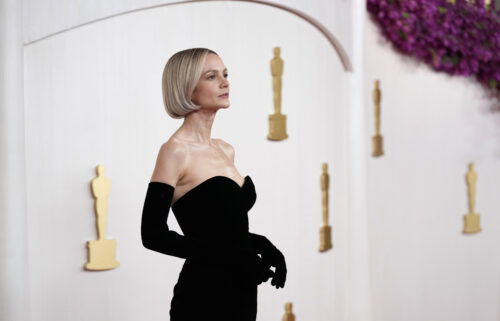Guilty Pleasures

By Associated Press
Berlin Film Festival brings Israeli-Palestinian tensions and other issues into the spotlight
BERLIN | The 74th Berlin International Film Festival opens Thursday with the world premiere of “Small Things Like These” starring man of the moment Cillian Murphy.
Murphy, a front runner at next month’s Oscars for his turn in “Oppenheimer,” plays a coal merchant in 1980s Ireland who uncovers shocking secrets kept by the convent in his town. Based on an Irish novel, the drama reunites Murphy with “Peaky Blinders” director Tim Mielants and co-stars Eileen Walsh, Michelle Fairley and Emily Watson. The film explores Ireland’s Magdalene laundries, Catholic-run institutions from the 18th to the late 20th century intended to reform those deemed “fallen women.”
Politics is never far from the agenda at the Berlinale, but it’s the ongoing war in Gaza that is likely to spark debate and demonstrations. Festival directors Mariette Rissenbeek and Carlo Chatrian, who will step down after this year, expressed their aim for “open dialogue” surrounding the war. When they introduced this year’s program, they said they were “concerned to see that antisemitism, anti-Muslim resentment and hate speech are spreading in Germany and around the world.”
Plenty of films and documentaries this year support this desire for dialogue, including the documentary “No Other Land.” It’s about Israeli settler violence in the West Bank and the unlikely friendship that develops between a Palestinian activist and an Israeli journalist, directed by a Palestinian-Israeli collective.
The Berlinale has also partnered with social activists to create the “Tiny Space” project, with a small, intimate cabin set up for several days near the red carpet where festival attendees can discuss and debate the crisis in the Middle East.
But these efforts haven’t stopped some, including Ghanaian director Ayo Tsalithaba and Indian American artist Suneil Sanzgiri, from withdrawing their films from the festival in protest of Germany’s support for Israel.
Meanwhile the festival, which has long championed Iranian directors, has made a plea to Tehran to allow directing duo Maryam Moghaddam and Behtash Sanaeeha to attend this year. They are due to present their new movie “My Favourite Cake” but face a travel ban by Iranian authorities. The Berlinale said in a statement that they have had their passports revoked and face a court trial in relation to their work as artists and filmmakers. The film, which will compete for the top prize, the Golden Bear, tells the story of a woman who decides to live out her desires in a country where women’s rights are heavily restricted. The duo’s previous film, “Ballad of a White Cow,” premiered in competition in Berlin in 2021.
Politics are at play again when it comes to the festival guest list. Last week, organizers uninvited representatives of the far-right Alternative for Germany party, or AfD, to the opening gala. Five AfD politicians had been expected because members of all parties in Berlin’s state legislature are invited to events that are supported with public money. In recent weeks, Germany has seen large protests against the far right following a report that extremists met to discuss deporting millions of immigrants, including some with German citizenship, and that some members of AfD were present.
The festival said in a statement that “the AfD and many of its members and representatives hold views that are deeply contrary to the fundamental values of democracy.” The leader of AfD’s Berlin branch, Kristin Brinker, accused the festival of bowing to pressure from “cultural policy activists.” She argued that artists stand up for “freedom, for diversity and for plurality” but that festival organizers were doing the opposite.
Kenyan-Mexican actor Lupita Nyong’o will serve as the Berlinale’s first black jury president at this year’s festival. The Oscar winner will be joined on the jury by actor-directors Brady Corbet and Jasmine Trinca and directors Ann Hui, Christian Petzold and Albert Serra alongside Ukrainian writer Oksana Zabuzhko.
Last year’s jury head Kristen Stewart will return to Berlin with ‘80s thriller “Love Lies Bleeding,” a tale of bodybuilding, crime and revenge. Other eclectic titles starring big names include Adam Sandler as a lonely astronaut in “Spaceman,” based on a Czech novel; Stephen Fry and Lena Dunham as father and daughter in “Treasure” on a road trip through post-communist Poland; and Marvel’s Sebastian Stan is unrecognizable in psycho thriller “A Different Man” as an actor who is transformed by facial reconstruction surgery.
Martin Scorsese will receive an honorary Golden Bear for lifetime achievement at a ceremony on Feb. 20. Isabelle Huppert will return to Berlin to collect her unclaimed lifetime achievement from 2022, when the French acting icon could not attend. She returns this year with the movie “A Traveler’s Needs” from South Korean filmmaker Hong Sang-soo.
The festival runs through Feb. 25.
Harvey Weinstein is appealing 2020 rape conviction. New York’s top court to hear arguments
NEW YORK | Nearly four years after Harvey Weinstein was convicted of rape and sent to prison, New York’s highest court will hear arguments Wednesday in his quest to overturn the landmark #MeToo-era verdict.
Weinstein’s lawyers are asking the state’s Court of Appeals in Albany to dismiss the disgraced movie mogul’s 2020 conviction, arguing the judge trampled his right to a fair trial by “succumbing to the pressure” of America’s reckoning with sexual misconduct perpetrated by powerful figures.
The judge, James Burke, allowed testimony from three women whose allegations weren’t part of the case and ruled that prosecutors could confront Weinstein about other, unrelated misbehavior if he had testified, which he declined to do.
“What we’re arguing is that there should not be a different set of rules for an individual in society who becomes vilified,” Weinstein’s lawyer, Arthur Aidala, said. There can’t be “the Weinstein rule that just applies to that little sliver of society that everyone decides to really hate,” he said.
Weinstein, 71, was convicted February 24, 2020 of a criminal sex act for forcibly performing oral sex on a TV and film production assistant in 2006, and rape in the third degree for an attack on an aspiring actress in 2013. He was sentenced to 23 years in prison and is incarcerated at the Mohawk Correctional Facility, a state prison about 100 miles (161 kilometers) northwest of Albany.
Weinstein was acquitted at the same Manhattan trial of first-degree rape and two counts of predatory sexual assault stemming from actor Annabella Sciorra’s allegations of a mid-1990s rape. The Associated Press does not generally identify people alleging sexual assault unless they consent to be named; Sciorra has spoken publicly about her allegations.
Last year, Weinstein was convicted in Los Angeles of raping and sexually assaulting an Italian actor and model, who said he appeared uninvited at her hotel room door during a film festival there in 2013. He was sentenced to an additional 16 years in prison in that case, meaning he’d still be locked up even if the Court of Appeals were to rule in his favor.
Weinstein maintains his innocence. He contends any sexual activity was consensual. He is not expected to attend Wednesday’s arguments, which pertain only to the New York case, but may monitor the court’s livestream from prison. The court is not likely to rule immediately.
The New York Court of Appeals agreed last year to take Weinstein’s case after an intermediate appellate court upheld his conviction. Weinstein’s lawyers want a new trial, but only for the criminal sexual act charge. They argue the rape charge can’t be retried because it involves alleged conduct outside the statute of limitations.
Allegations against Weinstein, the once powerful and feared studio boss behind such Oscar winners as “Pulp Fiction” and “Shakespeare in Love,” ushered in the #MeToo movement. His New York trial drew intense publicity, with protesters chanting “rapist” outside the courthouse.
In their appeal, Weinstein’s lawyers argued that Burke swayed the trial’s outcome with repeated rulings favorable to prosecutors, including decisions that “overwhelmed” the trial with “excessive, random, and highly dubious prior bad act evidence.” Burke’s term expired at the end of 2022. He was not reappointed and is no longer a judge.
Had Weinstein testified, Burke ruled that prosecutors would’ve been able to question him about more than two-dozen alleged acts of brutish behavior over 30 years, including whether he’d stranded a colleague in a foreign country or screamed at restaurant staff while demanding a late-night meal.
Weinstein’s lawyers argued Burke’s rulings went beyond what’s normally allowed — detailing motive, opportunity, intent or a common scheme or plan — and essentially put the ex-studio boss on trial for crimes he wasn’t charged with and hadn’t had an opportunity to defend himself against. That evidence would have served “only to make the jury hate Weinstein,” his lawyers said.
Rules vary by state on calling witnesses to testify and allowing prosecutors to present evidence about “prior bad acts” aside from the actual charges. New York’s rules are among the more restrictive.
They also challenged Burke’s refusal to remove a juror who had written a novel involving predatory older men, as well as his decision to allow prosecutors to have an expert on victim behavior and rape myths testify while rejecting testimony on similar subjects from defense experts.
A five-judge panel in New York’s intermediate appellate court ruled unanimously in 2022 that Burke had “providently exercised” his discretion, though some of the judges had previously raised doubts about his conduct. During oral arguments, Judge Sallie Manzanet-Daniels said that Burke had let prosecutors pile on with “incredibly prejudicial testimony” from additional witnesses.
Aidala said he wants the Court of Appeals to remind the state’s trial courts “that a defendant cannot be tried based on his character — but must be tried based on the conduct for which he has been accused.”
David Bouley, New York City chef known for his idiosyncratic approach to fine dining, dies at 70
NEW YORK | David Bouley, the award-winning and frenetic chef whose idiosyncratic haute cuisine and crusty breads pleased critics and the public during a career chasing sleek deliciousness, has died. He was 70.
Bouley died of a heart attack Monday at his home in Kent, Connecticut, according to Lisa Queen, his literary agent.
Along with Daniel Boulud, Alain Ducasse and Jean-Georges Vongerichten, Bouley was part of a culinary vanguard in the 1980s that created the New American style and turned fine dining into an expressive art form, leading to the rise of rock star chefs.
“Cravings are for flavor. Intellectual cooking is a blast but what people want without thinking comes from the physical sensation of flavor,” he told Wine Spectator in 2012.
His dishes included serving raw yellowfin on a ring-molded mound of baby fennel, nestled in an emulsion decorated with dozens of dots of various herb oils. He served pineapple and artichokes with skate and added peppermint to lobster consommé. One of his signature dishes was a mushroom flan with cru Beaujolais.
“He is as responsible as any chef for the high Gothic style of the ‘80s,” Grub Street wrote in 2017. People magazine named him one of its “50 Most Beautiful People” in 1994.
Bouley followed his muse, willing to change a menu on the fly, close a restaurant on a whim, and experiment with sous-vide cooking or Japanese kaiseki. He began cooking traditional French rustic dishes like braised rabbits and later in life stressed naturopathy with nutrient dense dishes. The New York Times lauded him for “his hungry mind and insatiable appetite for change, motion and new information.”
Bouley was born in Storrs, Connecticut, with dual French and American citizenship and trained in kitchens in Cape Cod, Massachusetts, and Santa Fe, New Mexico, as well as France and Switzerland.
After studying at the Sorbonne, he worked for such chefs as Roger Vergé, Paul Bocuse, Joel Robuchon, Gaston Lenôtre, and Frédy Girardet. He learned his craft in the kitchens of Le Cirque, Le Périgord and La Côte Basque.
Bouley spent much of his career cooking in the Tribeca neighborhood of Manhattan, starting with Montrachet when it opened in 1985 — earning three stars from The New York Times — and then his own restaurant, Bouley, two years later.
Other restaurants he worked in include Danube, Bouley Bakery, Upstairs at Bouley, Bouley at Home, Secession and Brushstroke, a collaborative effort with the Tsuji Culinary Institute in Osaka, Japan. Danube and Bouley Bakery each earned two Michelin stars. Brushstroke earned a Michelin star in its first year and landed on GQ’s list of the 10 best restaurants in America.
The restaurant Bouley — which famously had a foyer filled with apples — closed in 2017 after 30 years and several location changes, earning a three-star from the New York Times the year previously. The critic highlighted what he called the most dramatic dish, a Malibu sea urchin in its spiky shell, filled with tofu, soy, vinegar, yuzu jelly, salmon trout roe, sea urchin and yuzu sorbet.
Bouley Bakery became a base of operations for relief right after the 9/11 terror attacks in cooperation with the Red Cross, and more than 1 million meals were prepared and served at ground zero, although there were allegations some money was misappropriated.
Bouley trained a new generation of chefs, including Dan Barber, Eric Ripert, Christina Tosi, César Ramirez, Amy Scherber, Alex Ureña, Anita Lo, Galen Zamarra, Kurt Gutenbrunner, Brian Bistrong and Bill Yosses.
Among his awards are the title of Outstanding Chef in 1995 and 2000, and Outstanding Restaurant in 1991 from the James Beard Foundation. He also sold a line of chairs, tables and mirrors.
He is survived by his wife, Nicole Bartelme.
—From AP reports



